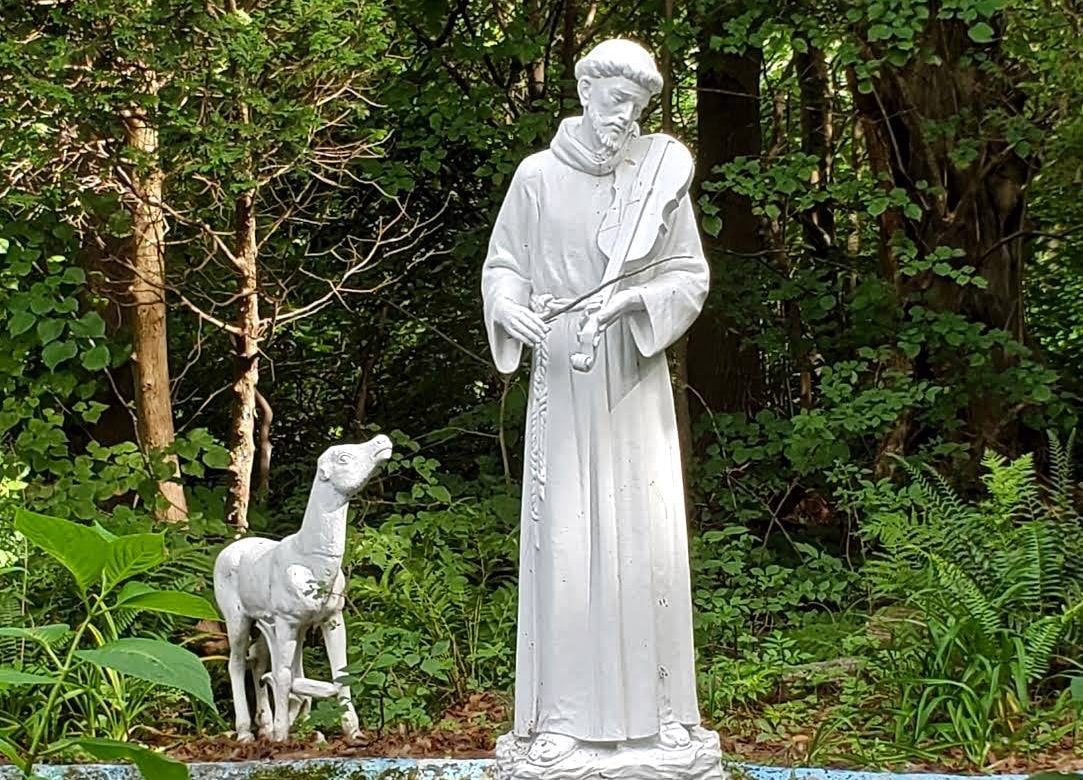At the St. Anthony Franciscan Friary in Kennebunk, Maine. Image: DFG Hailson Lord, make me an instrument of Your peace. Where there is hatred, let me sow love; Where there is injury, pardon; Where there is doubt, faith; Where there is despair, hope; Where there is darkness, light; And where there is sadness, joy. O …
Sunday’s Palms Are Wednesday’s Ashes
Sunday's palms are Wednesday's ashes as another Lent begins; Thus we kneel before the Maker in contrition for our sins. We have marred baptismal pledges, in rebellion gone astray; Now returning, seek forgiveness; grant us pardon, God, this day! We have failed to love our neighbors, their offenses to forgive, Have not listened to their …
Provocative and Evocative Words
James 1:26; 3:1-12 In the early 1970s, comedian George Carlin made headlines across the world with his “Seven Words You Can Never Say on Television.” He began the routine by saying, "There are 400,000 words in the English language, and there are seven of them you can't say on television. What a ratio that is: …
A Time for Everything and a Season for Every Purpose
“There is a time for everything and a season for every purpose under heaven.” Time. From time to time. For the time-being. Time-honored, timeless, timely, time-sharing, time-worn. Time heals all wounds. Time wounds all heels. Time is always a circus packing up and moving away. Living is entirely too time-consuming. Time and tide wait for …
Continue reading "A Time for Everything and a Season for Every Purpose"
Intersections and Transformations
I came to faith in Jesus Christ on Pentecost Sunday in 1982 at a Billy Graham Crusade held at Boston University's Nickerson Field. The Reverend Graham’s signature is on my Master of Divinity diploma from Gordon-Conwell Theological Seminary; he was one of that institution’s founders and was chairman of the seminary’s board during my years …
A Prayer of Confession
I have adapted the following from the Book of Common Prayer and personalized the words by changing the plurals to singulars that I might offer this confession as an individual. Perhaps you'll feel led to join me in lifting this. Almighty and most merciful Father, I have erred, and strayed from Your ways like a …
Unforgiveness: A Loose Cannon Below Decks Redux
The first sermon I ever preached was based on the passage in this entry. Over the years, as I've grown in my understanding of this scripture, this core issue of the faith, this key to living a life of peace and hope, I’ve added to it. This is the most recent iteration. _____ Colossians 3:12-13: …
Continue reading "Unforgiveness: A Loose Cannon Below Decks Redux"
Ziplining
“Trust in the Lord with all your heart and lean not on your own understanding; in all your ways acknowledge Him, and He will make your paths straight” -- Proverbs 3:5-6 One afternoon, I participated in a “Zipline EcoSafari” at the Forever Florida Park in St. Cloud. To get us up where we needed to …
Eugenics and Extropic Transhumanism: “Perfection” at What Cost?
Today, when we think of eugenics, our thoughts most likely turn to mid-twentieth century Germany and Nazi efforts to create a “pure race” by eliminating those considered unworthy of contributing to the chain of heredity. What many may not know, however, is that the eugenics movement was well established in the United States before it …
Continue reading "Eugenics and Extropic Transhumanism: “Perfection” at What Cost?"
Crambazzled by Snollygosters
I've come upon all too many snollygosters who have crambazzled me for days on end with their twattling and brabbling. I would have benefitted from a bit of lethologica prior to this day, but I am happy to report I am now closer to regaining a sense of respair and have grown scripturient about my …
The Rest is Part of the Making of the Music
He withdrew… to a solitary place (Matthew 14:13). There is no music during a musical rest, but the rest is part of the making of the music. In the melody of our life, the music is separated here and there by rests. During those rests, we foolishly believe we have come to the end of …
Continue reading "The Rest is Part of the Making of the Music"
Against Liberal Theology: Putting the Brakes on Progressive Christianity
Review of Against Liberal Theology: Putting the Brakes on Progressive Christianity (Grand Rapids: Zondervan, 2022) In the introduction to Against Liberal Theology, author Roger E. Olson states that his goal in writing the book was to provide “a warning aimed mainly at those who think of themselves as progressive Christians,” a warning about “not sliding into true liberal …
Continue reading "Against Liberal Theology: Putting the Brakes on Progressive Christianity"
“Identifying and Holding the Line”
I earned my Master of Divinity degree at Gordon-Conwell Theological Seminary (GCTS); was ordained in the American Baptist Churches USA; pastored churches for nearly twenty years; served as a visiting professor of world religions and spiritual formation at GCTS and was an Assistant Professor of Evangelism and Renewal and Director of the D.Min. in the …
Welcome Happy Morning!
John 20:1-18; 1 Corinthians 15:1-8 Welcome Happy Morning, age to age shall say. Hell today is vanquished, Heaven is won today. Lo! The dead is living, God forevermore; Him, their true Creator, all His works adore. Come then, true and faithful, Now fulfill Thy Word! Tis Thine own third morning, Rise O Buried Lord! Show …
Not Just a Lifeboat for Stranded Intellectuals
“But Christianity is not just a useful lifeboat for stranded intellectuals. If it isn’t literally true, it isn’t valuable. Whether Jesus Christ actually rose from the dead matters. It mattered to St Paul. ‘If Christ has not been raised, your faith is futile; you are still in your sins.’ And it should matter to us…As …
Continue reading "Not Just a Lifeboat for Stranded Intellectuals"
From Acclamation to Crucifixion
Mark 11:1-11 and Matthew 27:45-61 Palm Sunday, also called Passion Sunday, is the day on which we recall Christ’s triumphal entry into Jerusalem; it is also the day on which we recount the sufferings of our Lord Jesus in the week that followed. This Holy Week began with Jesus’ arrival in Jerusalem where He was …














